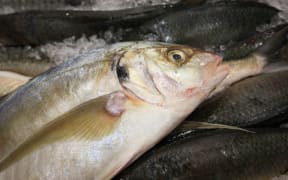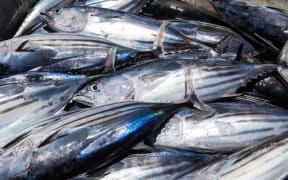Lawyers for Māori fisheries body Te Ohu Kaimoana and two of its directors have rejected claims a fund set aside to help urban tāngata whenua is favouring those with iwi affiliations.

The High Court in Wellington Photo: RNZ / Alexander Robertson
The National Urban Māori Authority (NUMA) and Te Waipareira Trust have taken Te Ohu Kaimoana to the High Court in Wellington over how it administers and allocates the $20 million fund in its Te Pūtea Whakatupu Trust.
The issue is whether the money should go to people with iwi affiliations or those who simply identify as urban Māori.
Te Pūtea Whakatupu Trust was established in 2004 as part of the urban Māori Treaty of Waitangi settlement, and is governed by the Māori Fisheries Act 2004.
It was designed to help people without iwi affiliations.
Its directors are John Tamihere, Rikirangi Gage and Richard Jefferies. But the urban authorities argue Mr Tamihere is the only one suitable to be in that role, as the others are iwi-affilliated.
Te Ohu Kaimoana is also representing Mr Gage and Mr Jefferies at the hearing.
NUMA said the body was not abiding by a settlement agreed as part of the Māori Fisheries Act.
Its lawyers said yesterday that Mr Gage and Mr Jefferies did not regard themselves as urban Māori, were prioritising those who did instead, and were "iwi-centric".
But Te Ohu Kaimoana lawyer Paul Radich QC said today the urban authorities wanted to swing the pendulum too much the other way.
Section 82 of the Māori Fisheries Act stated "the benefits of Te Putea Whakatupu Trust must be made available as widely as possible to all Māori, including those who do not have iwi affiliations".
He described some of the claimants' statements as absolutism, by wanting all three of Te Pūtea Whakatupu Trust's directors to have urban Māori affiliations and demanding to have the funds administered only to those without iwi affiliations.
Mr Radich told Judge Simon France it was enough that the board collectively had the knowledge required to administer the fund.
Another lawyer for the fisheries body, James Ferguson, said for the fund to be made available only to those who had no associations with iwi was "too narrow a definition".
Mr Ferguson said there were other Māori who had iwi affiliations but who lived in urban areas. That should be included, he said - and chastised the urban Māori advocates for what he described as their rigidity.
There was no need for a model fully weighted to Māori who only affiliated as urban tāngata whenua, he said.
Independent review
Last year, barrister Tim Castles conducted an independent review of Te Ohu Kaimoana. He recommended it be scrapped, and iwi be given control of the fishing quota they owned.
Despite that, iwi across the country voted to keep it in June. At the time, NUMA chair Willie Jackson said the authority was appalled at a recommendation, made by a sub-committee of Te Ohu Kaimoana, that iwi take control of Te Pūtea Whakatupu Trust's $20m fund.
Mr Castles said parts of the Māori Fisheries Act had hindered the trust in its performance of its duties and functions.
He also noted problems with gaining a quorum and problems with getting all three directors of the trust to work together.
Urban Māori authorities' view
In summing up for the claimants, Bruce Gray QC said iwi already got most of the $500m in assets from the fisheries settlement - and the $20m put aside for the trust should be only for urban Māori.
Mr Gray said it was important to define urban Māori "not in an iwi- or euro-centric way, but by association".
He said there had been a fundamental misunderstanding of Section 88.2 of the Māori Fisheries Act.
The lawyer criticised the way in which iwi had assessed Mr Castles' review of Te Ohu Kaimoana: "The 95 percent benefit the iwi enjoy infected the way they thought it appropriate to look at the review."
No-one from Te Ohu Kaimoana was available for comment.
The judge reserved his decision, which is expected to be made in the next few weeks.





